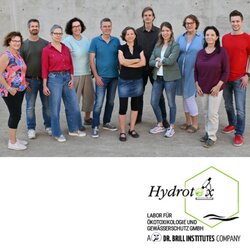Strong portfolio expansion through Hydrotox

Since January, the DR. BRILL INSTITUTES Group has grown by an important segment. With the age-related retirement of laboratory co-founder Dr. Stefan Gartiser from the management board, Hydrotox Labor für Ökotoxikologie und Gewässerschutz GmbH (the laboratory for ecotoxicology and water protection) in Freiburg, was integrated into the DR. BRILL INSTITUTES Group. This is a very attractive addition to the portfolio for both the Group and its customers.
What does Hydrotox bring to the table? In fact, all chemicals must be tested for their environmental compatibility in accordance with European chemicals legislation. Hydrotox, for example, covers the part of this that deals with how the respective substance behaves in water. Among other things, this involves the effects of the substances on the living environment, which is tested in the laboratory using model organisms such as algae, small crustaceans and fish. In addition, it is also tested whether the chemicals are well degraded in the sewage treatment plant.
The degradability of plastic and microplastics is also a very important topic in a global context. The Freiburg team's portfolio also includes testing for genotoxic effects, in which bacteria are used to test whether substances have mutagenic effects.
"To put it simply, we generally look at the extent to which these substances can have harmful effects on our environment and everyday life," says laboratory coordinator Dr. Christoph Hafner. "This can be explained most clearly using the example of pesticides: These chemicals are deliberately released into the environment in large quantities. In addition to the desired toxic effect on pests to protect the plants, no undesirable side effects on aquatic organisms or beneficial insects should occur if possible."
The testing of chemicals in the Hydrotox laboratory is carried out in accordance with the principles of Good Laboratory Practice (GLP). For this purpose, the laboratory is inspected by the state authority every three years and then receives certification that tests for the risk assessment of chemicals may be carried out.
While customers from the large chemical industry usually know exactly what they need and ask for it specifically, "smaller companies often don't know the exact regulatory background," says Hafner. "We can then describe to them in detail which tests need to be carried out during the consultation. With our colleagues from Regulatory Services in the DR. BRILL INSTITUTES Group, we are now in a very strong position to do this!"
In addition to laboratory work with biotest systems that have a high sample throughput, the Hydrotox team also contributes its expertise to research projects that are funded by third parties. This can include, for example, the implementation of corresponding literature studies or the development of website content. Industrial customers are also advised on how they can produce in a more environmentally friendly way.
The fact that Hydrotox joined the DR. BRILL INSTITUTES Group as a new subsidiary at the beginning of 2024 is an attractive addition to the portfolio. In addition to Brill's high level of expertise in the efficacy testing of disinfectants, Hydrotox brings this know-how for algicides to the group. Several years ago, the two companies had already jointly developed award criteria for eco-labels in third-party funded projects for environmentally friendly antifouling underwater coatings.
Other projects are also concerned with proving that algicides are effective in ponds or swimming pools, or how the formation of biofilms can be prevented in the cooling water of power plants.
"Some of the corporate customers are actually the same, we just have to deal with different departments," says Dr. Christoph Hafner. A major advantage of Hydrotox is the perfectly complementary five-person management team. "Each of us has a special scientific background, so we are very broadly based and flexible. We often develop tests according to customer requirements that are not included in any guideline."
With this team, companies receive individual support that is not subject to complex project management. The customer thus has a direct line to his investigation. Dr. Christoph Hafner (agricultural biologist) is responsible for overall laboratory management, quality management and customer care. His colleague Dr. Patrick Schwartz (graduate biologist) heads the ecotoxicity department. Biologist Andrea Brunswik-Titze and her colleague Felicitas Flach (Dipl. Ing. Environmental Sciences) are responsible for biodegradability. As head of the test facility, Dr. Ines Heisterkamp is responsible for compliance with GLP regulations, but otherwise primarily works on third-party funded and industrial customer research projects and, as a marine biologist, contributes her specialist knowledge of algae.
"We are privileged that the long-standing owner Dr. Stefan Gartiser will continue to support us with his immense expertise as a consultant," says Hafner. "The broad positioning enables us to react quickly to the changing needs of the market and reorganize our resources accordingly."